Topic: Kansas v. Colorado
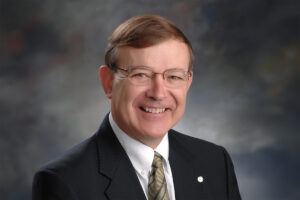
Interview of Dave Heinemann, January 18, 2021
Interviewed by Rex Buchanan
In this early 2021 oral history interview, former State Representative Dave Heinemann recalls the influences that led him to run for office to represent the Garden City area in Finney County, Kansas. He attributes familiarity with farming in southwest Kansas, where water availability is always a challenge, with his understanding of water issues. In this interview, Heinemann talks about the various perspectives from which Kansans evaluate local control of water use. As Chair of the Energy and Natural Resources Committee, Heinemann was able to see how attitudes about public policies regarding the environment frequently cut across party lines. Show More A prior oral history interview of Heinemann can be found in the Statehouse Conversations collection on this site. Show Less
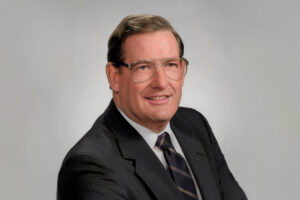
Interview of Carl Holmes, September 3, 2020
Interviewed by Rex Buchanan
In this 2020 oral history interview, former State Representative Carl Holmes discusses his observations of state water policy formulation in the 1970's through 2012. Holmes began his involvement in water policy as a farmer and active member of his community in southwest Kansas. In many respects, his experiences reflect the water-energy nexus. Holmes describes how he had observed cities and irrigators mining water in southwest Kansas. He recalls developing a comprehensive understanding of water issues by interviewing the managers of the state’s water resources. In this interview, Holmes describes how he managed the House Energy and Natural Resources Committee by Show Morecreating subcommittees and educating members on how to work bills and guide them through the process. He discusses his bipartisan work with Representative Ken Grotewiel and other committee Democrats in the 1990s, actions that resulted in the Speaker removing him from the chairmanship of the committee. Holmes describes how irrigation changed over time from flood to sprinklers and how the sprinkler systems have become more efficient. However, Holmes observed that groundwater levels continue to decline leading to abandoned wells, the growing of crops that require less water, the return to dryland farming, and, for some, the call for diversion of water from distant sources, such as the Missouri River, to sustain farming and communities on the plains. Show Less
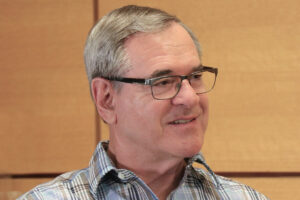
Interview of David Pope, September 19, 2019
Interviewed by Rex Buchanan
In this 2019 oral history interview, David Pope describes how the awareness of declining water levels in the High Plains Aquifers in Kansas led to efforts to support wise use and responsible management of groundwater in the state. He describes being hired to address groundwater issues from the local perspective and how he was involved in the creation the Groundwater Management District (GMD) in southwest Kansas. As Assistant Chief Engineer of the Department of Agriculture’s Division of Water Resources and later Chief Engineer, Pope was involved in a state policy limiting new groundwater development, referred to as planned Show Moredepletion, along with efforts to develop regulations on water management to replace the prior ad hoc approach. Pope discusses his dealings the U.S. Army Corps of Engineers in assuring minimal desirable streamflow to satisfy municipal and industrial water users along with conservation and recreation interests. He describes the complex interplay of surface and groundwater use policies which became a politically highly charged issue in addressing the Cheyenne Bottoms wetlands issue, Pope explains how the water law premise of "first in time, first in right" has been modified with amendments and regulations that require the filing of water rights, development of conservation plans to assure the beneficial use of water, mandatory metering of water use, and closure of areas for new water rights, all based on hydrologic studies. He concludes that although some GMDs have not tackled long-term depletion problems in western Kansas, two districts have adopted successful strategies: safe yield rules adopted by Groundwater Management District No. 2, and the creation of the Local Enhanced Management Area (LEMA) in Sheridan County to regulate irrigation. Pope describes those successes and speculates on why others have not been as successful. Show Less
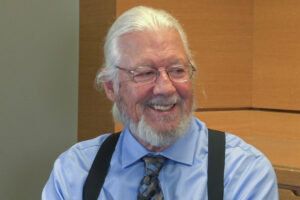
Interview of Leland (Lee) Rolfs, October 28, 2019
Interviewed by Rex Buchanan
In this oral history interview recorded in 2019, Lee Rolfs explains that few regulations governed water use when he began working at the Division of Water Resources of the State Board of Agriculture in 1978. He describes how the State responded to depletion of the Ogallala aquifer by creating Groundwater Management Districts (GMD) to manage future development, and to create a comprehensive system to address water issues. Rolfs recalls how the policy positions switched over time from the State being reluctant to regulate groundwater use when the GMDs initially sought restrictions to the opposite, with the GMDs opposing regulations Show Morewhen the State sought to impose them. He recalls his work on ground-breaking litigation with Colorado over water in the Arkansas River (Kansas v. Colorado). That case spanned over 25 years of his career with the State. Rolfs expounds on the Water Appropriation Act and its importance in the development of Kansas and its limitations in addressing the issue of long-term declines in the water table. He observes that cooperation, knowledge, and education are essential for properly managing water in Kansas. Show Less
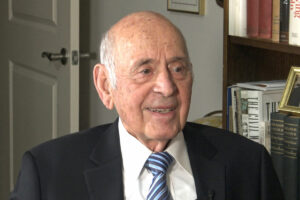
Interview of Bob Stephan, October 21, 2020
Interviewed by Michael (Mike) Matson
Former Attorney General Robert T. Stephan, in this 2020 oral history interview, recalls the highlights of his years serving the State of Kansas as Attorney General (1979 to 1995). Stephan's career as a champion of children as well as victims of crime and discrimination was shaped by his upbringing in Wichita and his strong sense of what it right. Stephan laments the increasingly partisan atmosphere of the National Association of Attorneys General, an organization to which he belonged during his time in state service.
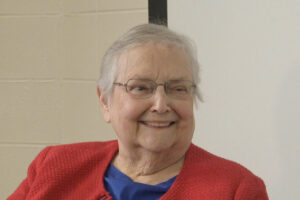
Interview of Joyce Wolf, November 15, 2019
Interviewed by Rex Buchanan
During her 2019 oral history interview, Joyce Wolf talks about her background working with environmental organizations on a variety of environmental issues. With a degree in bacteriology, she became interested in water quality issues before the creation of the U.S. Environmental Protection Agency (EPA). Wolf worked with Jan Garton, a key figure in environmental advocacy in Kansas, and a coalition of environmental groups supporting water rights for the Cheyenne Bottoms wetland area under the banner of “Save Our Bottoms.” Wolf was also involved in debates over the low-level radioactive waste disposal facilities. She elaborates in this interview on the Show Moresuccess of the coalition achieving an arrangement for adequate water supply for Cheyenne Bottoms and funding of the State Water Plan during the administration of Gov. Mike Hayden. Wolf recalls that environmental organizations were also concerned about the silting-in of the federal reservoirs, the decline of the Ogallala aquifer, the conflict over the Arkansas River that led to the Kansas v. Colorado lawsuit, and the loss of surface water in western Kansas. Wolf also discusses the cultural differences between Kansas and Minnesota that appears to reflect a lack of appreciation of the natural environment in Kansas. Show Less
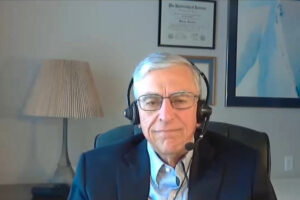
Interview of John Peck, February 5, 2021
Interviewed by Rex Buchanan
In this 2021 interview, John Peck, Emeritus professor of Law at the University of Kansas, recalls the early days of his career entering into the field of water law. His interview provides insight into the important elements of water law in Kansas and how they developed. Peck reflects on the effectiveness of Kansas laws and regulations governing water use. Peck also identifies continuing questions about existing water law and related practices. From his role as an active observer of the legal and regulatory culture that has developed around water in Kansas, Peck presents a unique perspective. Show More Show Less

Interview of Janis Lee and Laura McClure, May 20, 2024
Interviewed by Rex Buchanan
Janis Lee and Laura McClure, both Democrats elected from predominantly Republican districts that overlapped, often campaigned together and conducted constituent communication sessions in the areas they both represented. Because their time in the legislature (1989-2011) and their largely rural districts in northcentral Kansas intersected, Lee and McClure both worked on a wide range of policies pertinent to the Energy & Environment Collection of oral histories: confined feeding facilities, solid waste, waste tires, water quality standards, the Kansas v. Colorado lawsuit, and the Water Transfer Act that the city of Hays was exploring at the time of this interview, among Show Moreothers. In the energy arena, significant issues during their time of service in the Kansas Legislature included retail wheeling of electricity, gas pollution remediation, well plugging, and gas-gathering systems regulations. In this May 2024 interview, they explore those issues, the dynamics of the legislature, campaigning, and the work involved in serving in the legislature. Show Less
